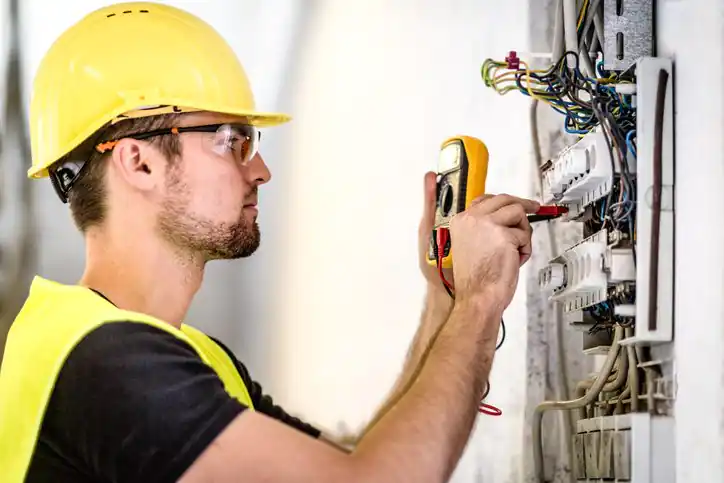If you want to get a Georgia electrical license, you’re in the right place. We broke down the requirements for gaining your Georgia electrical contractor license, including the requirements, the time it takes, reciprocity and renewals. Read on to find out more.

Georgia electrical license and insurance requirements

Do you need a Georgia electrical license to be an electrician?
According to Georgia’s rules and regulations, you need an electrician’s license to work as an electrician. However, unlike other states, Georgia does not have a journeyman licensure. Instead, after completing an apprenticeship program, individuals can work for a general contractor without supervision.
The Georgia State Board of Electrical Contractors oversees licensure. Georgia has two classifications for electrical contractor licenses — restricted (Class 1) and non-restricted (Class 2).
Insurance requirements for a Georgia electrical license
The right business insurance in Georgia helps you comply with regulations and provides a financial safety net. The type of small business insurance can vary based on your unique needs. Are you self-employed? Do you have employees? Do you work out of a commercial vehicle?
We break down your typical insurance needs below.
Workers’ Compensation insurance
If you employ three or more workers, Georgia requires you to have workers’ compensation insurance. This policy can help employees with workplace injuries, lost wages and medical costs.
Learn more about workers’ compensation for contractors.
General Liability insurance
General liability insurance in Georgia can help cover work-related accidents affecting your customers and their property. If a client files a legal claim against your business because they were injured on your jobsite or their property was damaged, liability can help pay for costs.
Learn more about general liability insurance for contractors.
Commercial Property insurance
Commercial property insurance helps cover commercial buildings and property, including equipment and tools.
Business Owner’s Policy
A business owner’s policy, or BOP insurance, provides broad coverage of general liability and commercial property policies combined in a single, more cost-efficient bundle. It can help cover damage that you or your employees may accidentally cause to another person’s property and help protect your business equipment in the event of a fire or other covered event.
Tools and Equipment insurance
If you need coverage for your tools and equipment, consider adding tools and equipment insurance to your small business insurance. It helps cover tools and equipment that are stolen, lost or damaged.
Commercial Auto insurance
Vehicles owned by a business and used for business purposes should be covered with commercial auto insurance.
In Georgia, minimum coverage requirements are:
- $25,000 for bodily injury per person
- $50,000 for bodily injury per accident
- $25,000 for property damage per accident
How to get a Georgia electrical license
It takes a few years to get your license. You are required to work under the supervision of a licensed electrical contractor for four years, including 8,000 hours of documented work.
When you get an electrician license in Georgia, you must begin the online process using the portal. (You can send paper copies, but you won’t be able to check your application status easily.)
The processing time is 20 business days, and you must completely restart the application process if you are missing a component. This processing includes a $30 application fee, with additional processing fees if you apply online or via mail.
Electrical contractor: restricted license (Class 1)
Class I electrical contractor licenses are restricted to low-voltage electrical work involving single-phase electrical installations that do not exceed 200 amperes.
You must work for a licensed electrician and document your work experience before applying for this license. Here are the full requirements:
- At least 21 years old and document
- Have a minimum of four years of experience in the electrical field
- Complete the application, including getting it notarized
- Background check
- Explanation and documentation of disciplinary action (if applicable)
- Work experience documentation
- Three references
- Affidavit of citizenship or immigration documents (read more about secure and verifiable documents)
Electrical contractor restricted license applicants must get authorization to take the electrical exam. PSI administers the exam, covering regulations (federal, National Electrical Code [NEC]) and technical functions. It is an open-book, multiple-choice exam. You must score at least a 70% to pass.
Electrical contractor: non-restricted (Class 2)
The next level is a non-restricted electrical contractor. Class II electrical contractor licenses are unrestricted and must document experience with installations in excess of single phase, 200 amperes systems.
Before applying, you must document four years (8,000 hours) of work experience with a licensed electrician. These are the requirements for a non-restricted license:
- At least 21 years old and document
- Have a minimum of four years of experience in the electrical field
- Application that is completed and notarized
- Pass a background check
- Work experience documentation
- Three references
- Affidavit of citizenship or immigration documents
- Background check
Applicants for unrestricted electrical contractor licenses must get authorization to take the electrical contractor exam. The exam is administered by PSI. It is an open-book, multiple-choice exam. You must score at least a 70% to pass.
GA license renewal requirements
If your license needs renewal, you must renew by June 30 on even-numbered years (every two years). There is a late renewal period of July 1 – July 31.
The state of Georgia requires four continuing education hours each year (a total of eight hours per renewal).
You must log in to the Georgia Online Licensing site to process your license renewal. It costs $75 to renew an electrician license in Georgia and $100 for late renewals.
Georgia electrical license reciprocity
If you have a license in the following states, you can apply for a reciprocal license in Georgia:
- Alabama
- Louisiana
- North Carolina
- South Carolina
- Tennessee
You will need to complete the Georgia reciprocity agreement and mail it to the Georgia licensing board.
How NEXT supports Georgia electricians
NEXT insures Georgia electricians. We focus on small businesses — it’s our specialty. We’ll help you get electrician insurance to check off all state laws and requirements for licensing.
You can access all of our services online. You can apply for coverage and get a certificate of insurance in minutes. You can take your proof of insurance to any job site and apply for your electrician license.
You don’t have to sweat about insurance while you apply for your license.
Start a free instant quote with NEXT.
Do you want to work as an electrical contractor in another U.S. state? Learn what states require licenses in our guide to electrician license requirements.
This information has been provided as a service. It is correct and up-to-date to the best of our knowledge; however, it is in no way intended to offer legal advice and you must always consult with local authorities before you make any business decisions. Regulations and requirements may change at any time.




